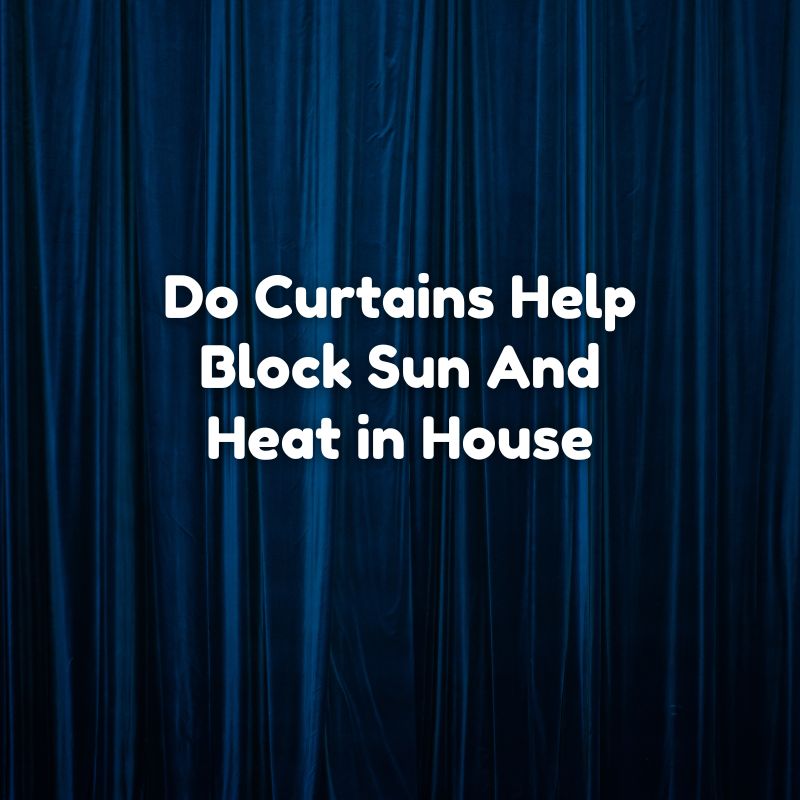
Do Curtains Help Block Sun and Heat in Your House?
Curtains are a staple in home decor, often chosen for their aesthetic appeal. However, beyond their decorative value, curtains play a critical role in managing the indoor climate of your home. This blog post explores the effectiveness of curtains in blocking sun and heat, helping you maintain a comfortable living environment. We’ll dive into the science behind it, the types of curtains best suited for the job, and tips for maximizing their benefits. Whether you’re looking to save on energy bills or simply keep your home cooler, understanding how curtains can help is key.
The Science Behind Curtains Blocking Sun and Heat
Curtains are not just a piece of fabric hanging on your windows. They are a functional barrier that can significantly impact the amount of sunlight and heat that enters your home. Here’s how:
Thermal Insulation: Curtains, especially those with thermal linings, can act as a barrier to heat. They work by trapping air between the window and the curtain, creating a layer of insulation that reduces heat transfer.
Reflecting Sunlight: Some curtains are designed with reflective surfaces that bounce sunlight away from the window, preventing it from penetrating into the room. This can reduce the overall heat gain inside your house.
Blocking UV Rays: Curtains can block harmful UV rays, which are not only responsible for increasing the temperature inside your home but also for fading your furniture and flooring.
Types of Curtains That Are Effective in Blocking Sun and Heat
Not all curtains are created equal when it comes to blocking sun and heat. Here are the types of curtains that are most effective:
Blackout Curtains: These curtains are made from thick, tightly woven fabrics that block out almost all light and heat. They are ideal for bedrooms, media rooms, or any space where you want to minimize heat and light exposure.
Thermal Curtains: Specifically designed to provide insulation, thermal curtains have a layer of foam or rubber backing that helps keep heat out in the summer and retain warmth in the winter.
Solar Curtains: These curtains are made from reflective materials that bounce sunlight away from the windows. They are particularly effective in reducing the amount of heat that enters your home during the hottest parts of the day.
Honeycomb Shades: While technically not curtains, honeycomb shades are worth mentioning. They trap air in their cellular structure, providing excellent insulation against heat.
How to Maximize the Effectiveness of Curtains in Blocking Sun and Heat
To get the most out of your curtains, consider the following tips:
Layering Curtains: Use a combination of sheer and blackout curtains. The sheer curtains allow light to enter while diffusing it, and the blackout curtains provide the necessary insulation when fully drawn.
Close Curtains During Peak Sunlight Hours: The hottest part of the day is usually between 10 a.m. and 4 p.m. Keep your curtains closed during these hours to reduce heat gain.
Use Curtain Rods That Fit Snugly: Ensure that your curtains cover the entire window and that there are no gaps where sunlight can seep through. A snug fit helps to maximize the insulating effect.
Invest in Quality Materials: Choose curtains made from heavy, tightly woven fabrics. The denser the fabric, the better it will be at blocking heat and sunlight.
Consider Curtain Linings: Adding a thermal or blackout lining to your existing curtains can significantly enhance their ability to block heat and sunlight.
Benefits of Using Curtains to Block Sun and Heat
Energy Savings: By reducing the amount of heat entering your home, curtains can lower your reliance on air conditioning, leading to significant energy savings.
Enhanced Comfort: Rooms with properly installed curtains remain cooler and more comfortable, even on the hottest days.
Protecting Furniture and Flooring: Curtains block UV rays, which can cause fading and deterioration of your furniture, carpets, and flooring.
Improved Sleep: Blackout curtains not only block heat but also create a dark environment that is conducive to better sleep, especially in bedrooms.
Increased Privacy: Curtains provide an added layer of privacy, preventing prying eyes from looking into your home, especially during the day.
FAQs About Curtains Blocking Sun and Heat
Do all curtains block heat?
Not all curtains are effective at blocking heat. Blackout, thermal, and solar curtains are specifically designed for this purpose.
Can curtains replace the need for air conditioning?
While curtains can significantly reduce heat gain, they cannot entirely replace air conditioning in extremely hot climates. However, they can reduce the load on your air conditioning system, leading to energy savings.
Are lighter-colored curtains better for blocking heat?
Lighter-colored curtains are better at reflecting sunlight, which can help reduce heat gain. However, for maximum heat blockage, choose curtains with thermal or blackout linings.
Can I use curtains in combination with other window treatments?
Yes, combining curtains with shades or blinds can provide additional insulation and enhance heat-blocking effectiveness.
How do I clean thermal or blackout curtains?
Most thermal and blackout curtains are machine washable. However, always check the care label for specific instructions to avoid damaging the fabric or lining.
Do curtains help in the winter as well?
Yes, curtains provide insulation that can help keep your home warmer in the winter by reducing heat loss through windows.
How do I choose the right curtains for my home?
Consider the room’s function, the amount of sunlight it receives, and your aesthetic preferences. For maximum heat blocking, opt for thermal or blackout curtains.
Conclusion
Curtains are a versatile and effective solution for blocking sun and heat in your home. By choosing the right type of curtains and using them strategically, you can create a cooler, more comfortable living environment while also saving on energy costs. Whether you’re looking to protect your interiors from fading, enhance your privacy, or simply keep your home cooler, investing in high-quality curtains is a smart move.
